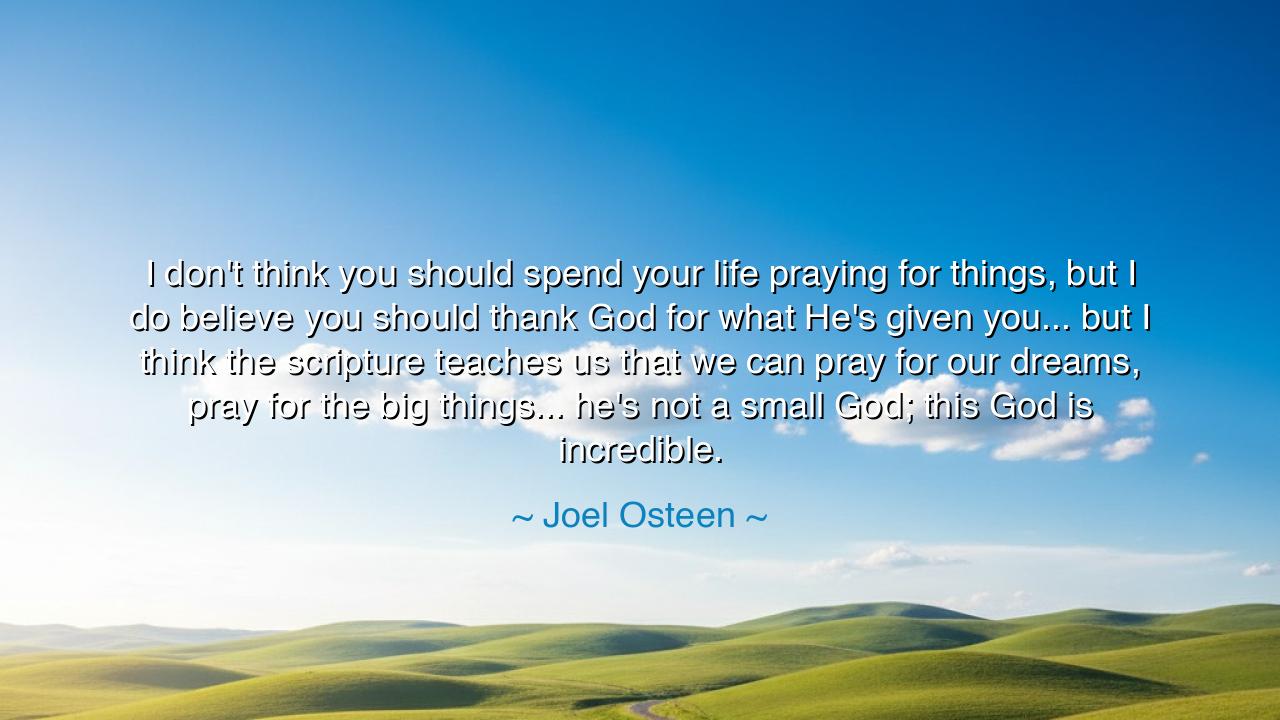
I don't think you should spend your life praying for things, but
I don't think you should spend your life praying for things, but I do believe you should thank God for what He's given you... but I think the scripture teaches us that we can pray for our dreams, pray for the big things... he's not a small God; this God is incredible.






“I don’t think you should spend your life praying for things, but I do believe you should thank God for what He’s given you… but I think the scripture teaches us that we can pray for our dreams, pray for the big things… He’s not a small God; this God is incredible.” Thus spoke Joel Osteen, a shepherd of faith in the modern age, whose words rise like sunlight over weary hearts. In this teaching, he reveals a truth as ancient as prayer itself — that faith is not only gratitude for what has been, but also boldness to ask for what could be. His message is one of balance: between thanksgiving and aspiration, between humble acceptance and daring belief in the greatness of God.
Osteen’s words spring from his understanding of the human heart — a heart that often fears to dream too greatly. Many believe that to pray for their dreams is to be selfish, that God should be thanked, not troubled with desires. But Osteen calls us to a higher faith — one that not only bows in gratitude, but also rises in courage. “He’s not a small God,” he declares, meaning that the Creator of galaxies and oceans does not think in limitations. To pray for great things, therefore, is not arrogance; it is faith in divine abundance. Just as the ancients lifted their eyes to the stars and believed the heavens vast enough to contain their hopes, so too must we lift our spirits to believe that the Infinite can bring forth miracles in our small and fleeting lives.
This teaching has its roots deep in scripture. In the Psalms it is written, “Delight yourself in the Lord, and He will give you the desires of your heart.” The prophet Elijah prayed for rain when the earth was dry, and the heavens answered. The patriarch Abraham prayed for a child when all hope seemed lost, and nations were born from his lineage. In each of these, prayer was not a cry of greed but of faithful expectation — a declaration that God’s greatness exceeds our limitations. So too, Osteen’s words remind us that gratitude and boldness are not opposites; they are partners in divine purpose. Gratitude keeps us humble, and boldness keeps us alive.
Yet, there is wisdom in his caution: “I don’t think you should spend your life praying for things.” Here, Osteen warns against the shallowness of asking only for possessions or comfort. To pray only for things is to reduce the sacred to the material. True prayer, he teaches, begins in thankfulness — for every breath, every mercy, every sunrise. But from that foundation of gratitude, faith must then ascend. Once we have thanked God for what we have, we must dare to believe Him for what is yet to come. For faith is not static; it is motion, reaching ever upward toward the divine.
Consider the story of George Washington Carver, the humble scientist born into slavery, who once prayed not for wealth or recognition, but for understanding. “Lord,” he said, “teach me the secrets of Your universe.” In answer, God revealed to him the wonders of the peanut, the sweet potato, and the soil — humble things that changed the destiny of agriculture. Carver’s prayer was not for luxury but for purpose, not for gold but for guidance. Like Osteen, he believed in a God not of small measures, but of infinite creativity — a God who listens to the prayer of the dreamer and delights in fulfilling it.
Through his words, Osteen invites us to approach prayer not as beggars, but as children of the divine — thankful, yet unafraid to ask. “Pray for the big things,” he urges, for small prayers reveal small faith. To limit our prayers is to limit our vision of God’s power. The same Spirit that spun the stars listens to the whispers of your heart; the same hand that shaped mountains can shape your destiny. If the Creator is incredible, then we must live with incredible expectation — not because we deserve it, but because He delights in giving.
So, my children of faith and longing, take this lesson to heart: begin every prayer with gratitude, but end it with vision. Thank God for what you have, but never stop believing in what He can still do. Do not shrink your hopes to match your fear — expand them to match His greatness. Pray not for trinkets, but for transformation. Pray not for riches, but for the fulfillment of your divine purpose.
For as Joel Osteen teaches, the greatest sin is not to dream too greatly, but to dream too small. He is not a small God; He is incredible. And those who dare to believe this truth will find their prayers answered in ways beyond their imagination — not always as they expected, but always as they needed. Live, then, with a grateful heart and a daring spirit, for the one who thanks and dreams in faith walks in the light of the Almighty Himself.






AAdministratorAdministrator
Welcome, honored guests. Please leave a comment, we will respond soon